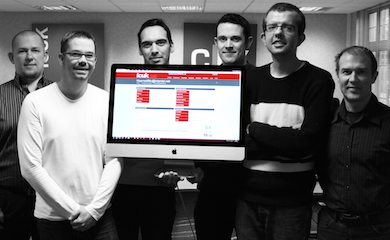 Daisy Group's incoming CEO, Neil Muller, has revealed plans to take the company on the next step in its journey towards national supremacy, and he has shown himself as a determined figure.
Daisy Group's incoming CEO, Neil Muller, has revealed plans to take the company on the next step in its journey towards national supremacy, and he has shown himself as a determined figure.
The Daisy growth campaign is now in full cry. Muller's inspired appointment is likely, over time, to prove a historic moment for the Group - but can Daisy really seize the opportunity to be the premier ICT supplier for SMEs? A positive outcome is inevitable, says Muller unequivocally, and his growth plan is meticulously reasoned. Prior to joining Daisy he spent 21 years running Computacenter's UK business in the enterprise market as Managing Director. Former Daisy Group CEO Matt Riley (now Executive Chairman, who founded the firm in 2001 and grew its turnover to £350-plus million) said Muller's appointment is 'vital' for developing Daisy's growth in the ICT space, especially its managed services portfolio and the mid-market in particular.
This sense of coherent ambition between Muller and Riley typifies Daisy on the brink of its next growth challenge. "I was drawn by Matt's clear focus and ambition to be the communications and IT services partner of choice in the UK's small and mid-market arena," commented Muller. "Having helped steer Computacenter within the enterprise space to become a key services partner for customers, vendors and BPO players, I am absolutely confident that Daisy can also become a key partner within the ever-growing world of ecosystems."
Muller departed Computacenter with a 'heavy heart' eased by immense pride in his work at the firm having led significant growth and achieving success in building a sustainable services business. But after 21 years it was time for a new challenge and Daisy offered a rare opportunity that Muller describes as 'immense'. "My attentions and excitement now turn to working with the Daisy family," he commented. "Daisy has experienced tremendous growth throughout its history, but now we embark on the next phase of the journey. Two focus areas are to leverage the scale of the Daisy Group and enhance its capability, ensuring that our solutions remain competitive and relevant with a service quality delivered through customer-centricity. "
Even in its formative years Daisy was no advertisement for small is beautiful, such is the size of Riley's ambition. Fittingly, Muller's appointment is a desirable match. He also thinks big and plans to build on Group scale, develop and implement required standards and systems, drive operational effectiveness and efficiency, protect and serve existing business through tip-top customer satisfaction and focus on empowering fully engaged and enabled employees.
"Business doesn't need to be complicated," added Muller. "In fact, the simpler you can make it, more often than not the better the results. My near-term aim is to outline a simple growth plan that provides all employees with a sense of clarity, belonging and purpose. The plan will focus on our strategy, growth priorities and our execution. Employee engagement and enablement delivers high levels of customer satisfaction which in turn drives business results. So it is my mission to deliver the best experience possible for customers and our staff. We will look to simplify the complex and focus on the benefits and the business outcomes that technology enables."
Muller is also preparing the ground for closer channel partnerships characterised by a collaborative approach that will generate greater rewards. "I would like us to rethink the way in which we engage around certain types of partner opportunities," he explained. "We have an amazing opportunity to create stronger partnerships and ecosystems by working side-by-side and more proactively with our partners, enabling them to deliver more complete solutions to their customers.
"First and foremost, we will preserve and enhance the trust that existing partners have in Daisy today. I want Daisy to be the easiest and most fulfilling company to do business with. We will continue to listen closely to our partners, always focusing on building partner advocacy and continually evolving our systems and processes accordingly. I want to ensure that we fully extend our scale, reach and product range to our partners."
Daisy's inherent strengths go hand in hand with Riley's deep desire for the business to evolve and change with the times. This combination caught Muller's eye and was a factor that attracted him to the CEO role. "Five years ago, over 80 per cent of Daisy's revenues were around voice services, now a declining market as consumers and businesses shift to mobile, IP, over the top services and alternative methods of communication," commented Muller. "Under Matt's leadership Daisy has diversified away from voice which today represents less than 40 per cent of group revenues."
The story of Daisy's recent history, during its five years as a Plc, is one of impressive growth and value creation. From 2009 to 2014 revenues and EBITDA grew on average by 27 per cent and 52 per cent year-on-year. Investors in Daisy's shares in 2009 would have seen a return of 150 per cent over the period. "We are in a great market at a great time," said Muller. "CEOs are starting to see investment in technology as an enabler for differentiation and delivering growth. I am therefore confident that by sticking to the basics of running a great business, putting our customers and employees first and leading a great team we can achieve our growth aims. And let's keep our fingers crossed that macro-economic factors continue to deliver a stable backdrop for business growth."
According to Muller, SMEs need unprecedented help in managing the complexity of technology, widening the scope for Daisy to embark on an exciting new era of consultancy augmented by complementary aids to growth. "Daisy has real brand strength as a champion for this sector in traditional telecoms products," Muller added. "What is less well known is that we already have significant strengths outside of telecoms - in hosting, cloud and IT services. I see a natural convergence of these areas crystallised for our customers in simple-to-buy and easy-to-consume managed services. In three years time, I am confident that we will see Daisy as a strong, recognised player in communications and IT managed services for the UK small and mid-market, leveraging our strong heritage in fixed and mobile connectivity."
Nothing separates a business from realising its goals more than a lack of company culture, believes Muller, who espouses a common vision for organisational values and behaviours. "The culture of an organisation is paramount," he stated. "I will be looking to build on the excellent culture of today through a single sense of purpose, belonging and pride in everything that we do. A high performing culture will help us deliver high performing results, which in turn will create opportunities for employees and our partners. And against a digital backdrop, I see a tremendous opportunity to deliver more value to our customers by offering faster, more secure and reliable voice, mobile and data connectivity and a range of connected value added and managed services."
Influencing future growth requires a solid set of skills that demonstrate relevant value and differentiation, and get results. "To stay relevant to our customers we need to strengthen and evolve our customer relationships, from an internally-focused 'sell to' business support model towards a much closer, horizontal and proactive 'sell with' partnership, helping our customers to add value to their end users and stakeholders," stated Muller. "We will focus on strengthening our customer relationships, while aligning our portfolio strategy to the digital business demands of the market."

 By Elvire Gosnold, Director, Blabbermouth Marketing: I want a modern, professional, clean website. This is what many of our clients want in their new website but everyone has a different opinion of what is modern and attractive.
By Elvire Gosnold, Director, Blabbermouth Marketing: I want a modern, professional, clean website. This is what many of our clients want in their new website but everyone has a different opinion of what is modern and attractive. Simwood has ‘grown-up' says Managing Director Simon Woodhead who lets us know what the company stands for as a channel champion in the making.
Simwood has ‘grown-up' says Managing Director Simon Woodhead who lets us know what the company stands for as a channel champion in the making. Government plans to crack down on nuisance callers do not go far enough according to Simwood's MD Simon Woodhead (pictured).
Government plans to crack down on nuisance callers do not go far enough according to Simwood's MD Simon Woodhead (pictured). The ICUK team have taken a bow after the successful roll out of Version 12 of the company's control panel for reseller partners.
The ICUK team have taken a bow after the successful roll out of Version 12 of the company's control panel for reseller partners. Falling prices and consumers' insatiable desire for multimedia content mean that the phablet phenomenon will continue into 2015 and beyond.
Falling prices and consumers' insatiable desire for multimedia content mean that the phablet phenomenon will continue into 2015 and beyond.